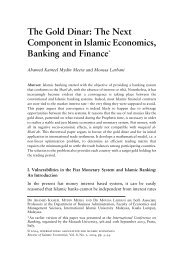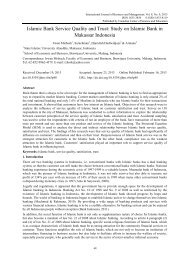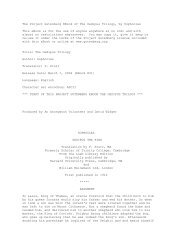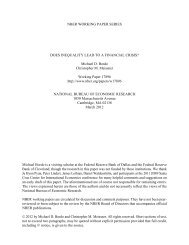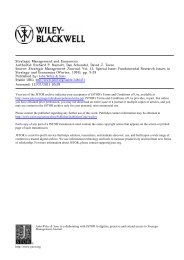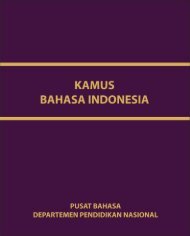The Oil Industry in Nazi Germany, 1936-1945
The Oil Industry in Nazi Germany, 1936-1945
The Oil Industry in Nazi Germany, 1936-1945
You also want an ePaper? Increase the reach of your titles
YUMPU automatically turns print PDFs into web optimized ePapers that Google loves.
258 BUSINESS HISTORY REVIEW<br />
notably the large iron and steel <strong>in</strong>terests), therefore supported a cutback<br />
<strong>in</strong> arms and autarky expenditures to cool down the overheated<br />
economy.9<br />
Cutbacks <strong>in</strong> rearmament and <strong>in</strong> autarky expenditures were, however,<br />
not possible for the <strong>Nazi</strong>s, given their political goals. Hermann<br />
Gor<strong>in</strong>g, supported by the army, thus proposed <strong>in</strong> mid-<strong>1936</strong> to <strong>in</strong>crease<br />
arms expenditures and to hasten the development of German synthetic<br />
<strong>in</strong>dustries, say<strong>in</strong>g that "all measures would be considered from the<br />
standpo<strong>in</strong>t of secur<strong>in</strong>g the conduct of war."'10 <strong>The</strong> outcome of the struggle<br />
between Schacht and G6r<strong>in</strong>g was to be expected, given Hitler's<br />
own beliefs and his role as supreme arbiter <strong>in</strong> the German government.<br />
On the basis of a Fiihrer directive of 4 April <strong>1936</strong>, G6r<strong>in</strong>g<br />
formed the Raw Materials and Foreign Exchange Staff, the first step<br />
towards the four-year plan that was formulated <strong>in</strong> September. <strong>The</strong> result<br />
was that G6r<strong>in</strong>g shortly thereafter became the central figure <strong>in</strong><br />
German economic policy, supersed<strong>in</strong>g Schacht."<br />
<strong>The</strong> new development had twofold significance. It constituted a formal<br />
recognition of the rift that had developed between big bus<strong>in</strong>ess<br />
and government regard<strong>in</strong>g autarky and rearmament. With the organization<br />
of the four-year plan, <strong>Nazi</strong> political aims took precedence over<br />
the predom<strong>in</strong>antly economic aims of German bus<strong>in</strong>ess.'2 Moreover,<br />
German <strong>in</strong>dustry was now divided <strong>in</strong>to two camps: those <strong>in</strong>dustries<br />
that stood to ga<strong>in</strong> substantially from the renewed commitment to rearmament<br />
and autarky-specifically build<strong>in</strong>g, chemicals, and eng<strong>in</strong>eer<strong>in</strong>g-and<br />
those that did not-coal and agriculture, for <strong>in</strong>stance.'3<br />
With<strong>in</strong> the German petroleum <strong>in</strong>dustry, both the crude and the synthetic<br />
sectors stood to ga<strong>in</strong> from the newly reaffirmed policies.<br />
Petroleum plann<strong>in</strong>g and <strong>in</strong>vestment <strong>in</strong> fact were the focal po<strong>in</strong>t of<br />
both the Raw Materials and Foreign Exchange Staff and the later fouryear<br />
plan. <strong>The</strong> plans of the earlier organization called for stockpil<strong>in</strong>g<br />
fourteen different raw materials, for which RM 600 million <strong>in</strong> foreign<br />
exchange per year was to be appropriated. Of this total, RM 250 million,<br />
the largest s<strong>in</strong>gle expenditure category, was to be used to build<br />
up petroleum stocks. In addition, of about RM 3 billion per year to be<br />
used to develop a domestic raw materials base, no less than RM 2<br />
billion was to be used for petroleum development. <strong>The</strong> figures were<br />
9 Mason, "Primacy of Politics," 179.<br />
"o Quoted <strong>in</strong> Petz<strong>in</strong>a, Autarkiepolitik, 43.<br />
1 Ibid., 40; Rich, Hitler's War Aims, 68-69.<br />
'1 Arthur Schweitzer, Big Bus<strong>in</strong>ess <strong>in</strong> the Third Reich (Bloom<strong>in</strong>gton, Ind., 1964), 537-47; Carr,<br />
Arms, 62.<br />
' Mason, "Primacy of Politics," 180. Wages rema<strong>in</strong>ed low <strong>in</strong> the German coal <strong>in</strong>dustry even though<br />
coal production was essential to German war production because the coal <strong>in</strong>dustry had little political<br />
power and did not deliver directly to the armed forces.



